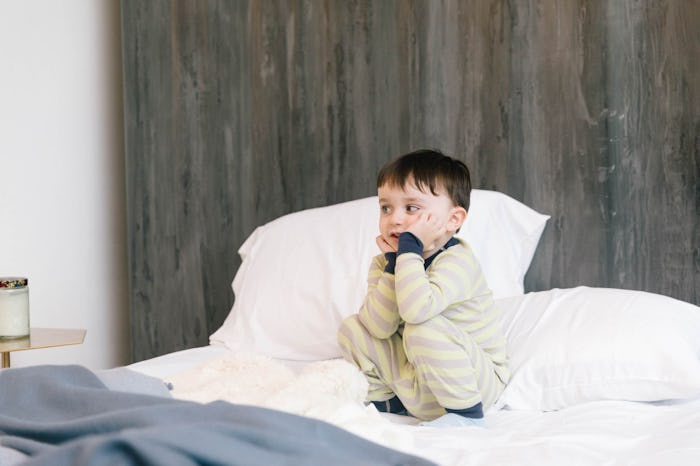Life
5 Things You Can Do If Your Child Comes Home With The Dreaded Stomach Bug
When you have kids, you quickly learn that dealing with viruses and infections is just a normal part of parenting territory. Kids love touching everything around them, making them easy targets for germs and bacteria that can make them sick. Treating a cold can be somewhat manageable, but if your child is sick with a norovirus or stomach bug, it may be harder to deal with. If your child is vomiting or has diarrhea, it can be overwhelming. Wondering what to do if your child has a stomach bug? Here are some things that can help.
It’s important to first understand how stomach bugs work. A stomach bug, also sometimes referred to as the stomach flu, is usually caused by a virus that can be picked up from exposure to a contaminated surface or food, explained Kids Health. Once the virus enters your child’s system, it can cause gastroenteritis and produce symptoms like stomach pain, diarrhea, and vomiting, the article noted.
Luckily, these symptoms should only last a couple of days. It can be a yucky and messy ordeal, but there are things you can do to manage the situation. Here are a few things you can do if your child has come home with a nasty stomach bug.
1Keep Them Hydrated
In an interview with Romper, Chicago area pharmacist, Bineesh Moyeed Pharm.D, says that the most important thing you can do when dealing with a stomach bug is to keep your child well hydrated. “With all that vomiting and diarrhea, your kids are losing lots of fluids and nutrients,” says Moyeed, “so you need to make sure their fluids are replenished.” She adds that kids can get easily dehydrated, so you should keep electrolyte-infused drinks like Pedialyte on hand, which can be offered to your child in small sips.
2Go Slow With Their Diet
According to the American Academy of Pediatrics (AAP), if you advance your child’s diet too quickly, or give them more food or liquid than their body is ready to tolerate, you could end up with more vomiting or diarrhea. The article noted that vomiting generally lasts around 24 hours in most cases of the stomach flu, so it’s important to go very slow and start by only offering your child small sips of clear liquids. You can then slowly add bites of light foods and see how your child tolerates them. If your child is still vomiting substantially after 24 hours, despite the light diet, the APA suggested checking in with your pediatrician.
3Make Sure Your Child Gets Plenty of Rest
It can be hard for kids to sit in one place, but when they are dealing with an illness like gastroenteritis, they may need to take a beat. According to the Mayo Clinic, dehydration caused by a stomach bug can make your child feel tired and fatigued, so you should encourage them to get some down time and rest. If you need to, you can put on their favorite movie or read a book with your child to help them relax.
4Disinfect Surfaces
Once your child is feeling better, the last thing you need is for them to get reinfected. The AAP suggested cleaning all of your most touched surfaces, including toys, with a disinfectant like bleach to keep germs from spreading. Make sure to wash all soiled clothes, towels, and bedding in hot water as soon as you can, and always remember to wash your hands and your kids' hands before eating and drinking.
5Don’t Medicate Without Your Doctor’s Permission
Naturally, you may want to give your child an antidiarrheal for their endless pooping, but you should talk to your doctor about it first. Moyeed says that in some cases, certain over-the-counter antidiarrheals can make your child’s condition worse by slowing down their digestion and keeping the bacteria in their stomach longer. “Before giving your child any kind of medicine,” suggests Moyeed, “always ask your doctor or pediatrician first.”
Check out Romper's new video series, Bearing The Motherload, where disagreeing parents from different sides of an issue sit down with a mediator and talk about how to support (and not judge) each other’s parenting perspectives. New episodes air Mondays on Facebook.
This article was originally published on
